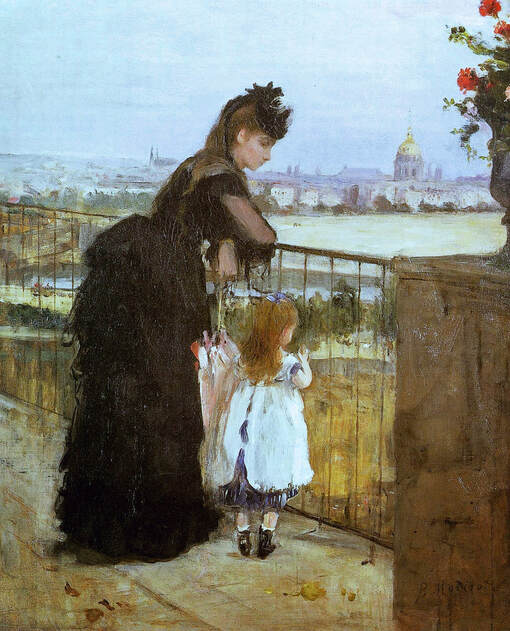|
Join us for biweekly ekphrastic writing challenges. See why so many writers are hooked on ekphrastic! We feature some of the most accomplished, influential poets writing today, and we also welcome emerging or first time writers and those who simply want to experience art in a deeper way or try something creative. The prompt this time is Woman and Child on a Balcony, by Berthe Morisot. Deadline is August 7, 2020. We are so pleased to have our longstanding contributor Alarie Tennille as guest editor for this challenge! Alarie has been a guest editor before, and she is a valued member of our prize nomination committee, as well as a recipient of the first annual Fantastic Ekphrastic awards here at The Ekphrastic Review. Welcome, Alarie! Message from Guest Editor Alarie Tennille Hello, Writers. Knowing how much fun it can be to write for these ekphrastic challenges and how you will stun me with variety, I’m already excited. Last year I selected an Ancient Egyptian Funerary Boat for your inspiration. This time I went in a very different direction. Recently I was invited to give a Zoom reading of my ekphrastic poems. The host asked me to begin by talking about my experience as a coed pioneer at The University of Virginia. I entered in 1970. Many people today are shocked that the school was that late accepting women, but Princeton went coed just one year before. Since I’d been the only girl in my high school trig class with no problem, I was shocked by the ugly response I got when I first arrived. The men in my own class were fine, but some upper classmen and faculty members felt it necessary to walk up to a small, shy girl and say, “We don’t want you here! You’re destroying our tradition. Thomas Jefferson didn’t found a school for girls.” Most infuriating was, “I voted against letting you come.” Why should they have had a vote about my civil rights? The court decided. I dug through old memories to share some of the most outlandishly sexist comments in the classroom. In my art history class on French Impressionism, the instructor told us that Mary Cassatt was the ONLY woman worth mentioning and that she only painted subjects interesting to women like moms with babies. “Not like the manly subjects of flowers and ballerinas painted by the male Impressionists,” I thought. At no time did he mention the many restrictions placed on women back then. They were not allowed to study art with the men, take life drawing classes, paint nudes, etc. Nor were they generally able to go roaming out alone to paint. But only in the last decade have I learned about more of the women artists overlooked through the centuries. Today is my chance to give Berthe Morisot the attention she deserves. I chose Woman and Child on a Balcony because I immediately saw four different ways to approach a poem. I didn’t bother looking for more, because I know you’ll surprise me. Alarie The Rules 1. Use this visual art prompt as a springboard for your writing. It can be a poem or short prose (fiction or nonfiction.) You can research the artwork or artist and use your discoveries to fuel your writing, or you can let the image alone provoke your imagination. 2. Write as many poems and stories as you like. Send only your best works or final draft, not everything you wrote down. (Please note, experimental formats are difficult to publish online. We will consider them but they present technical difficulties with web software that may not be easily resolved.) Please copy and paste your submission into the body of the email, even if you include an attachment such as Word or PDF. 3. Have fun. 4. USE THIS EMAIL ONLY. Send your work to [email protected]. Challenge submissions sent to the other inboxes will most likely be lost as those are read in chronological order of receipt, weeks or longer behind, and are not seen at all by guest editors. They will be discarded. Sorry. 5.Include MORISOT WRITING CHALLENGE in the subject line. 6. Include your name and a brief bio. If you do not include your bio, it will not be included with your work, if accepted. Even if you have already written for The Ekphrastic Review or submitted other works and your bio is "on file" you must include it in your challenge submission. Do not send it after acceptance or later; it will not be added to your poem. Guest editors may not be familiar with your bio or have access to archives. We are sorry about these technicalities, but have found that following up, requesting, adding, and changing later takes too much time and is very confusing. 7. Late submissions will be discarded. Sorry. 8. Deadline is midnight, August 7, 2020. 9. Please do not send revisions, corrections, or changes to your poetry or your biography after the fact. If it's not ready yet, hang on to it until it is. 10. Selected submissions will be published together, with the prompt, one week after the deadline. 11. Rinse and repeat with upcoming ekphrastic writing challenges! 12. Please share this prompt with your writing groups, Facebook groups, social media circles, and anywhere else you can. The simple act of sharing brings readers to The Ekphrastic Review, and that is the best way to support the poets and writers on our pages!
0 Comments
Your comment will be posted after it is approved.
Leave a Reply. |
The Ekphrastic Review
COOKIES/PRIVACY
This site uses cookies to deliver your best navigation experience this time and next. Continuing here means you consent to cookies. Thank you. Join us on Facebook:
July 2024
|




